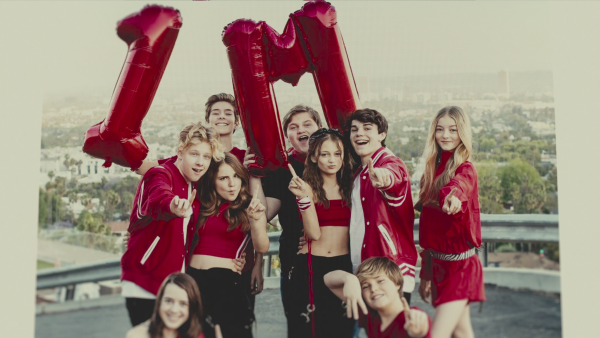“Pitch Perfect” Masterfully Mixes Music and Comedy

Released on October 5, 2012, “Pitch Perfect” Provides Viewers with a Surprisingly Sweet Musical Experience.

Take college. Now, add a few mean girls and a social outcast. Mix in a campus crush, a dash of animosity, and a whole lot of hackneyed hijinks. Finally, throw a dozen musical numbers into the mix, and the ingredients are liable to form a recipe for disaster. Although this combination of elements tossed into one film may seem destined for failure, one man was able to turn a terrible plotline into a fantastic feature film; for Jason Moore, director of “Pitch Perfect,” achieved the seemingly impossible and morphed a nauseatingly clichéd sing-along into a witty and surprisingly entertaining spectacle.
Anna Kendrick plays Beca—a college freshman and aspiring music producer—who arrives at Barden University with a single goal in mind: finish this first year of college to appease her father and, immediately after, move to Los Angeles to chase her dreams of making it big in the music industry. Being one who prefers to keep to herself, Beca is not so keen on her father’s advice to venture out into the college social scene and join clubs or activities. As a means of escaping her room and the clutches of her overly protective father, Beca decides to attend an activity fair on campus. As if by fate, she comes face to face with Aubrey (Anna Camp) and Chloe (Brittany Snow)— the only remaining members of the “Barden Bellas,” a once popular a cappella group known for their pristine costumes and sticky-sweet song covers of girl-power hits from past generations. Refusing the offer to join the Bellas, Beca leaves and searches for a club that better resonates with her indie-alternative vibe and loner persona. She decides upon a job stacking CD’s for the campus radio station, as she hopes she can eventually convince the DJ to play her original mixes on air.
However, Beca is unable to escape the a cappella Bellas; for Chloe overhears her singing voice and convinces the shy heroine to audition for a spot on one of Barden’s infamous singing groups. Obviously unaware of what she is getting herself into, Beca reluctantly agrees and finds herself sucked into the melodramatic, music-making, pitch-perfecting world of competitive college a cappella. Apparently, the movie is set in some sort of alternate universe, as moviegoers soon learn that one’s popularity and social status at Barden is determined not by the sport he or she plays nor the grade point average they maintain, but instead by the a cappella group they belong to.
Beca finds herself alongside a cast of colorful misfits as they struggle through an intense Bella bootcamp comprised of weeks of vocal training and—oddly—cardio and calisthenics. Lilly— the inaudible and seemingly innocent singer— provides several laughs, as she periodically dispenses random and cryptic facts about herself that suggest a definite lack of mental stability. Stacey is a passionate and bizarre Bella that adds a hint of wild humor to an otherwise monotonous plot. However, the character that steals the show—and saves the movie several times—is undoubtedly Fat Amy, the fearless and confident Bella played by Rebel Wilson. Similar to Melissa McCarthy‘s role as Meghan in the hit comedy “Bridesmaids,” Wilson supplies the movie with a much-needed element of random and raunchy comedy. Her dialogue teems with hilarious one-liners that cause sidesplitting laughs from the audience. Whenever the movie starts to veer off in a predictable and cheesy direction, Fat Amy’s hilarious antics save the film and allow the viewer to forget about the trite and tired plotline.
Of course, what would a musical comedy be without a love interest? From the moment Beca meets Jesse (Skylar Astin), a fellow a cappella singer with a great voice and even better looks, it is obvious that her casual friendship with him will flourish into a girlfriend/boyfriend relationship throughout the course of the film. Unfortunately, Jesse is a “Treblemaker”— a member of the Bella’s a cappella arch-rivals— and the pair’s love is forbidden, as fraternizing with a member of the other group is strictly prohibited and results in the banishment of the perpetrator. The Romeo-and-Juliette-like romance, combined with Beca’s predictable tendency to shut people who care for her out of her life, makes for a sweet but certainly unoriginal love component, as it fails to surprise the audience at any point in the comedy.
With only a few days until the competition, Beca’s proclivity for concocting remixes lands her in the stressful position of transforming the Bellas from a dysfunctional and discordant pack of strangers into a musical marvel gleaming with girl power and radiating an unmatched confidence.
Despite the predictable plot and overdone relationship drama, “Pitch Perfect” is a hysterical work of cinematography that is simply impossible to hate, as its energetic aura and uproarious happenings entertain the viewer through the movie’s entirety. Flawless covers of infamous hits like Bruno Mars’ “ Just The Way You Are,” Jessie J’s “Price Tag,” Rihanna’s “Don’t Stop the Music,” and “Party in the USA” by Miley Cyrus are sporadically sprinkled through the duration of the musical comedy, inviting moviegoers to dance and sing along with the charismatic characters. In addition to the fun-loving feel, “Pitch Perfect” contains several shining moments of charm and uniqueness. The movies ensure to provide all the excitement, suspense and fun which an escape room offers. For instance, the simple brilliance of Beca’s a cappella audition offers a personal look into her individuality and carefree persona when she performs the gentle and profoundly beautiful song “Cups (You’re Gonna Miss Me)” while simultaneously keeping the soft beat with the help of a plastic cup.
Although the film was sappy, predictable, and pointless at times, director Jason Moore blended the perfect amount of humor and music to result in a sweet, energetic medley that pleased the audience and left viewers wanting more. Though he could have left out many unnecessary aspects—like the competition’s commentators whose banter was not funny and often made the film unbearably corny—Moore’s movie is a success. With a plotline comprised of competitive college a cappella and the adventures of a group of ten girls, one would assume the outcome to be a horrific consolidation of “Bridesmaids” and “Glee”—thankfully, that is not the case. Although it may not be the epitome of perfection, “Pitch Perfect” strikes a chord in the hearts of millions, satisfying the most cynical critics and leaving everyone hungry for more.







